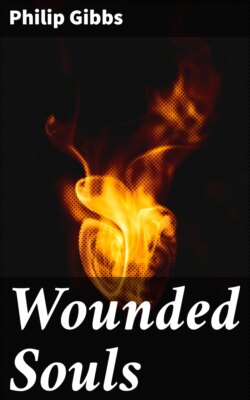Читать книгу Wounded Souls - Philip Gibbs - Страница 8
На сайте Литреса книга снята с продажи.
V
ОглавлениеTable of Contents
Wickham Brand paid his promised visit to the Chéri family, according to his pledge to Hélène, whom he had met in the street the previous day, and he had to drink some of the hidden wine, as I had done, and heard the story of its concealment and of Madame’s oath about the secret hoard of copper. I think he was more disconcerted than I had been by that avowal and told me afterwards that he believed no Englishwoman would have sworn to so deliberate a lie.
“That’s because the English are not so logical,” I said and he puzzled over that.
He was greatly taken with Hélène, as she with him, but he risked their friendship in an awkward moment when he expressed the hope that the German offer of peace (the one before the final surrender) would be accepted.
It was Madame Chéri who took him up on that, sharply, and with a kind of surprised anguish in her voice. She hoped, she said, that no peace would be made with Germany until French and British and American troops had smashed the German armies, crossed the German frontier, and destroyed many German towns and villages. She would not be satisfied with any peace that came before a full vengeance, so that German women would taste the bitterness of war as Frenchwomen had drunk deep of it, and until Germany was heaped with ruins as France had been.
Wickham Brand was sitting with the small boy on his knees, and stroked his hair before answering.
“Dites, donc!” said Hélène, who was sitting on the hearthrug looking up at his powerful profile, which reminded me always of a Norman knight, or, sometimes, of a young monk worried about his soul and the Devil.
He had that monkish look now when he answered.
“I don’t know,” he said. “I have felt like that often. But I have come to think that the sooner we get blood out of our eyes the better for all the world. I have seen enough dead Germans—and dead English and dead French—to last a lifetime. Many of the German soldiers hate the war, as I know, and curse the men who drove them on to it. They are trapped. They cannot escape from the thing they curse, because of their discipline, their patriotism——”
“Their patriotism!” said Madame Chéri.
She was really angry with Brand, and I noticed that even Hélène drew back a little from her place on the rug and looked perplexed and disappointed. Madame Chéri ridiculed the idea of German patriotism. They were brutes who liked war except when they feared defeat. They had committed a thousand atrocities out of sheer joy in bestial cruelty. Their idea of patriotism was blood-lust and the oppression of people more civilised than themselves. They hated all people who were not savages like themselves.
Wickham Brand shook his head.
“They’re not all as bad as that. I knew decent people among them before the war. For a time, of course, they went mad. They were poisoned by the damnable philosophy of their leaders and teachers.”
“They liked the poison,” said Madame Chéri. “They lapped it up. It is in their blood and spirits. They are foul through and through.”
“They are devils,” said Hélène. She shuddered as though she felt very cold.
Even the small boy on Brand’s knees said:
“Sales Boches!”
Brand groaned, in a whimsical way.
“I have said all those things a thousand times! They nearly drove me mad. But now it’s time to stop the river of blood—if the German army will acknowledge defeat. I would not go on a day after that, for our own sakes—for the sake of French boys and English. Every day more of war means more dead of ours, more blind, more crippled, and more agony of soul. I want some of our boyhood to be saved.”
Madame Chéri answered coldly.
“Not before the Germans have been punished. Not before that, if we all die.”
Hélène sprang up with a passionate gesture.
“All German babies ought to be strangled in their cradles! Before they grow up to be fat, beastly men.”
She was thinking of Schwarz, I imagine. It was the horror of remembrance which made her so fierce. Then she laughed, and said:
“O là là, let us be glad because yesterday we were liberated. Do not quarrel with an English officer, maman. He helped to save us.”
She put her hands on Wickham Brand’s shoulders and said:
“Merci, mon capitaine!”
So the conversation turned and Wickham won them back by his courtesy, and by a tribute to the courage of French civilians behind the lines, of whom he told many haunting stories.
But when I walked round with him to his mess—we were going round later to see Eileen O’Connor—he referred back to the incident.
“Daddy Small is right.” (He referred to the little American doctor.) “The hatred of these people is transcendental. It is like a spiritual flame. It is above all self-interest, kindly, human instincts, life itself. That woman would sacrifice herself, and her children, as quietly as she heard the death of her husband, rather than grant the Germans peace without victory and vengeance. How can there be any peace, whatever treaty is signed? Can Europe ever get peace, with all this hatred as a heritage?”
